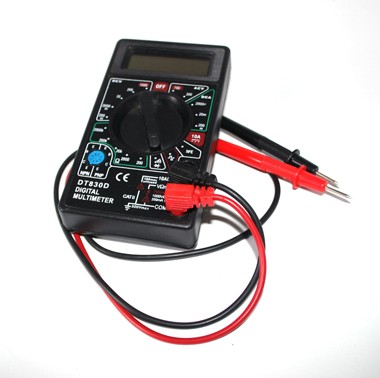You don’t have to have every tool in the world, of course. I used to know a plumber who swore that he only needed two tools for any job: duct tape, for anything that needs to stick together and isn’t, and WD-40, for anything that sticks together and shouldn’t. It’s probably worth going a little further afield than my friend the plumber, but if you aren’t planning to do an awful lot of any particular type of work, these five tools can get you through quite a few different projects.
1. Soldering Iron
Most people buy soldering irons for electronics work, although solder can be used to attach pretty much any two metal parts. Think of solder as a more selective version of duct tape. RadioShack has some pretty cheap irons, though there’s plenty of cursing around here whenever we have to solder something with our RadioShack special. I’m planning on upgrading to Jameco’s shortly —it’s a good investment. You’ll also want to keep some solder on hand: for small projects, a thin 60/40 (60% tin, 40% lead) with a rosin core, which will help your solder flow onto and attach to the metal you happen to be soldering, is ideal. Different solders are available for other types of projects.
2. Vise
There will come a time when you need an extra hand to just hold something still while you work on it. Until the doctors come up with a way to graft on extra arms, a vise is a good solution. Every hardware store carries vises and a brand name isn’t going to be a big deal. But there are a wide variety of vises available. I recommend going with a workshop vise — something heavy enough that you won’t knock it off the table while you work. A workshop vise can also hold a drying project without any help from you, freeing up your hands for the next step. For $20, you can get a 4 ½ inch workshop vise, which should handle most of your home needs.
3. Security Bit Set
The Man attempts to keep us from making changes to a whole variety of things by using funny shaped screws. Companies like Nintendo are notorious for this sort of thing. In order to get inside game consoles and such, you’ll need a security bit set. You can get a 33 bit set for under five bucks, but if you’re willing to shell out a full $10, you can get a full 100 bits. And remember, if you have a good security bit set, you can take apart pay phones, vending machines and other items that I am just going to assume you will come by legally.
4. Multimeter
You might think that you can skip the multimeter as long as you aren’t doing electronics work. After all, why else would you want to measure voltage, current and resistance? You’d be surprised, though, how many little household projects put you in contact with electronics, though. And who wants to check if an outlet is live by sticking their finger in it? You can get an absolutely basic multimeter at some dollar stores, though it’s worth springing for the RadioShack version — under $10 for a basic model —if you plan to use your new multimeter more than once. There are plenty of fancier multimeters that measure all sorts of things but they tend to be a bit more expensive.
5. Dremel
There are hundreds of other tools that I would love to own some day. But I’m not going to wait to finish my household hacks. These five tools will get me by in the meanwhile. At the end of putting together this shopping list, I’ve spent a total of $90. If I chose to go with slightly higher end models of the multimeter and the Dremel, I could still keep my total price at about $100. Not too bad for the wide variety of DIY projects this toolbox could take on, especially if you already have the basics and a stock of those ancillary items (like duct tape) that help projects go faster. Just writing this post has me thinking, though, about what tools I need for my next project — any recommendations?
